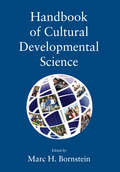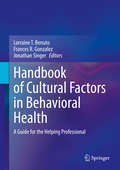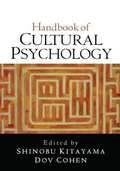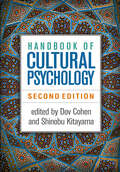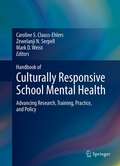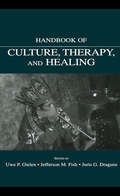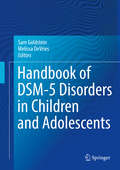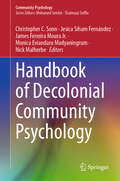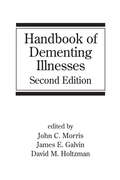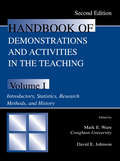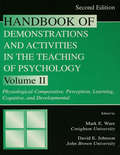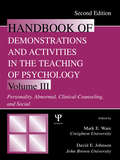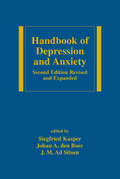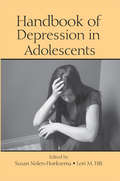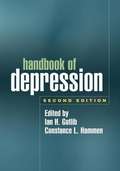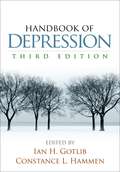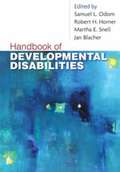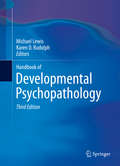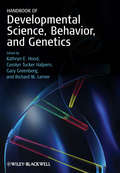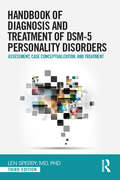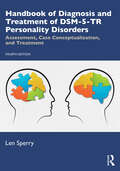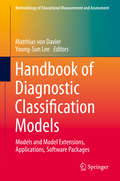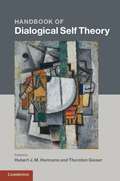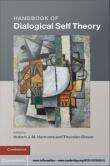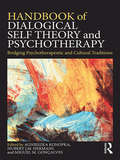- Table View
- List View
Handbook of Cultural Developmental Science
by Marc H. BornsteinResearchers and theoreticians commonly acknowledge the profound impact of culture on all aspects of development. However, many in the field are often unaware of the latest cultural literatures or how development proceeds in places other than their home locations. This comprehensive handbook covers all domains of developmental science from a cultural point of view and in all regions of the globe. Part 1 covers domains of development across cultures, and Part 2 focuses on development in different places around the world. The Handbook documents child and caregiver characteristics associated with cultural variation, and it charts relations between cultural and developmental variations in physical, mental, emotional, and social development in children, parents, and cultural groups. This contemporary and scholarly resource of culture in development covers theoretical, methodological, substantive, and ethnic issues as well as geographic approaches. Each chapter includes an introduction, historical and demographic considerations, theory, an overview of the most important classical and modern research studies, recommended future directions in theory and research, and a conclusion. The chapters focus on children from the prenatal stage through adolescence. Interdisciplinary in nature, the Handbook will appeal to human development theoreticians, researchers, and students in psychology, education, and pediatrics. Ideal for those new to the field, readers will appreciate the plethora of cultural examples from all fields of child and human development and developmental examples from all fields of cultural study.
Handbook of Cultural Factors in Behavioral Health: A Guide for the Helping Professional
by Lorraine T. Benuto Jonathan Singer Frances R. GonzalezHaving the knowledge and capacity to deliver therapy to a diverse population is recognized as benefiting client-therapist relationships and producing positive clinical outcomes. In fact, the APA requires that psychologists be aware of and respect the cultural characteristics of their clients which includes psychologists being aware of any biases and prejudice they may hold. Being aware of cultural characteristics, which include age, gender, ethnicity, race, religion and other cultural factors, is important. In the United States, minority ethnic groups are growing substantially, with 28% of the U.S. population identifying as races other than white (U.S. Census, 2016). Additionally, approximately 65 million people in America speak a foreign language that is not English, with over 25 million people having limited English language proficiency. With a diverse pool of clients, helping professionals should be better prepared to work with diverse clients. This handbook offers clinicians a comprehensive resource with which to work with diverse populations.The myriad discussions among the chapters include:Ethical guidelines for working with culturally diverse clientsCultural considerations in psychological assessment and evaluation Behavioral health service delivery with culturally diverse clientsCross-cultural factors in the treatment of trauma related disordersCultural considerations in the assessment and behavioral treatment of substance use disorders Handbook of Cultural Factors in Behavioral Health expertly offers clinicians a comprehensive set of resources and tools that will assist them working with diverse clients. Clinicians working with culturally diverse clients, as well as researchers and students learning about how cultural factors are relevant to the helping profession will all find this volume an integral addition to their library.
Handbook of Cultural Psychology
by Shinobu Kitayama Dov CohenBringing together leading authorities, this definitive handbook provides a comprehensive review of the field of cultural psychology. Major theoretical perspectives are explained, and methodological issues and challenges are discussed. The volume examines how topics fundamental to psychology-identity and social relations, the self, cognition, emotion and motivation, and development-are influenced by cultural meanings and practices. It also presents cutting-edge work on the psychological and evolutionary underpinnings of cultural stability and change. In all, more than 60 contributors have written over 30 chapters covering such diverse areas as food, love, religion, intelligence, language, attachment, narratives, and work.
Handbook of Cultural Psychology, Second Edition
by Shinobu Kitayama Dov CohenNow completely revised (over 90% new), this handbook offers the authoritative presentation of theories, methods, and applications in the dynamic field of cultural psychology. Leading scholars review state-of-the-art empirical research on how culture affects nearly every aspect of human functioning. The volume examines how topics fundamental to psychology--such as cognition, emotion, motivation, development, and mental health--are influenced by cultural meanings and practices. It also addresses the psychological and evolutionary underpinnings of cultural stability and change. The second edition reflects important advances in cultural neuroscience and an increasing emphasis on application, among many other changes. As a special bonus, purchasers of the second edition can download a supplemental e-book featuring several notable, highly cited chapters from the first edition. New to This Edition: *Most chapters are new, reflecting nearly a decade of theoretical and methodological developments. *Cutting-edge perspectives on culture and biology, including innovative neuroscientific and biopsychological research. *Section on economic behavior, with new topics including money, negotiation, consumer behavior, and innovation. *Section on the expansion of cultural approaches into religion, social class, subcultures, and race. *Reflects the growth of real-world applications in such areas as cultural learning and adjustment, health and well-being, and terrorism.
Handbook of Culturally Responsive School Mental Health
by Mark D. Weist Zewelanji N. Serpell Caroline S. Clauss-EhlersSchools across the United States - as well as much of the world - are experiencing widespread change. Students are more diverse ethnically, academically, and emotionally. More attention is being paid to abuse and neglect, violence and bullying, and the growing inequities that contribute to student dropout. Within this changing landscape, cultural competence is imperative for school-based professionals, both ethically and as mandated by educational reform. The Handbook of Culturally Responsive School Mental Health explores the academic and behavioral challenges of an increasingly diverse school environment, offering workable, cost-effective solutions in an accessible, well-organized format. This timely volume updates the research on cultural competence in school-based interventions, describes innovative approaches to counseling and classroom life, and demonstrates how this knowledge is used in successful programs with children, adolescents, and their families. Populations covered range widely, from African American and Asian American/Pacific Islander families to forced migrants and children who live on military bases. By addressing issues of training and policy as well as research and practice, contributors present a variety of topics that are salient, engaging, and applicable to contemporary experience, including: - Adolescent ethnic/racial identity development. - Culturally responsive school mental health in rural communities. - Working with LGBT youth in school settings. - Cultural competence in work with youth gangs. - Culturally integrated substance abuse prevention and sex education programs. - Promoting culturally competent school-based assessment. - School-based behavioral health care in overseas military bases. - Developmental, legal, and linguistic considerations in work with forced migrant children. - Cultural considerations in work/family balance. The Handbook of Culturally Responsive School Mental Health is a must-have reference for researchers, scientist-practitioners, educational policymakers, and graduate students in child and school psychology; educational psychology; pediatrics/school nursing; social work; counseling/therapy; teaching and teacher education; and educational administration.
Handbook of Culture, Therapy, and Healing
by Jefferson M. Fish Uwe P. Gielen Juris G. DragunsEmotional, as well as physical distress, is a heritage from our hominid ancestors; it has been experienced by every group of human beings since our emergence as a species. And every known culture has developed systems of conceptualization and intervention for addressing it. The editors have brought together leading psychologists, psychiatrists, anthropologists, and others to consider the interaction of psychosocial, biological, and cultural variables as they influence the assessment of health and illness and the course of therapy. The volume includes broadly conceived theoretical and survey chapters; detailed descriptions of specific healing traditions in Asia, the Americas, Africa, and the Arab world. The Handbook of Culture, Therapy, and Healing is a unique resource, containing information about Western therapies practiced in non-Western cultures, non-Western therapies practiced both in their own context and in the West.
Handbook of DSM-5 Disorders in Children and Adolescents
by Sam Goldstein Melissa DevriesThis handbook synthesizes and integrates the science of internalizing and externalizing childhood disorders with the diagnostic structure of the Diagnostic and Statistical Manual - 5th Edition (DSM-5) of the American Psychiatric Association. It offers a comprehensive overview of DSM-5 disorders in childhood, covering etiology, symptom presentation, assessment methods, diagnostic criteria, and psychotherapeutic and pharmacological approaches to treatment, prognosis, and outcomes. Clinical vignettes and empirical insights illustrate key concepts and diagnostic and treatment issues such as developmental, cultural, gender, and other considerations that may influence diagnosis and case formulation. In addition, chapters on psychosocial therapies offer robust guidelines for working with children and adolescents with DSM-5 disorders. The Handbook also addresses the shift from categorical to dimensional, diagnostic, and treatment systems, particularly focusing on the current shift in funded research in childhood disorders. Topics featured in this Handbook include: Intellectual disabilities and global developmental delay. Depressive disorders in youth. Posttraumatic and acute stress disorders in childhood and adolescence. Autism spectrum and social pragmatic language disorders. Alcohol-related disorders and other substance abuse disorders. Parent-child and sibling relationships. Cognitive-behavioral interventions and their role in improving social skills. The Handbook of DSM-5 Disorders in Children and Adolescents is a must-have resource for researchers, professors, and graduate students as well as clinicians, professionals, and scientist-practitioners in clinical child and school psychology, pediatrics, social work, and educational psychology.
Handbook of Decolonial Community Psychology (Community Psychology)
by Christopher C. Sonn James Ferreira Moura Jr. Jesica Siham Fernández Nick Malherbe Monica Eviandaru MadyaningrumThis handbook offers refined interpretations of decolonial thought, methodologies, and practices in community psychology. As a representative mapping of the broad range of decolonial cosmovisions, experiences, and praxes in community psychology and allied disciplines around the globe, it brings together contributions from North America, Latin America, Europe, Oceania, Africa, and Asia. It offers an overview of community psychology with a decolonial focus and from a transnational perspective, transcending intellectual, geographical, and cultural borders, and constraining identities, affirming and celebrating the unique identities, experiences, and positions of its contributors within the global landscape of knowledge and politics. The handbook illuminates the dynamic intersections between resistance and colonial legacies, foregrounding the enduring struggles against settler colonialism and racial capitalism across diverse geographies, temporalities, and histories. Underscoring the urgency of addressing inter-connected local and global challenges, such as land rights, livelihoods, and dignified existence, it offers hopeful yet critical perspectives on radical social justice struggles around the globe. The volume brings together contributions from scholars, academics, educators, researchers, practitioners, activists, and community collaborators, and its chapters range in style and format. Some are more aligned with academic writing, while others - in the spirit of decolonizing disciplinary logics - are structured through more undisciplined, less constrained writing forms. Each author was invited to question the coloniality of power in and beyond community psychology. As such, the handbook contains productions that trouble the manifestations of coloniality both in the past and in the present, as well as in the different territories of the Majority World, particularly within settler colonial nation-states. As a seminal work, the Handbook of Decolonial Community Psychology will further define and shape the contours of knowledge in decolonial community psychology, and inspire new generations of scholars, practitioners, students, and community organizers to advance the field with innovative ideas and transformative practices.
Handbook of Dementing Illnesses (Neurological Disease and Therapy)
by James E. Galvin John C. Morris David M. HoltzmanAn up-to-date survey of the major dementing disorders, this guide provides the most recent clinical, epidemiological, and neurodiagnostic information related to the care and treatment of dementing illnesses-addressing subjects of vital importance such as ethics, neuropsychology, neuroimaging, and neuropathology to stand as the foremost guide on the
Handbook of Demonstrations and Activities in the Teaching of Psychology: Volume I: Introductory, Statistics, Research Methods, and History
by David E. Johnson Mark E. WareFor those who teach students in psychology, education, and the social sciences, the Handbook of Demonstrations and Activities in the Teaching of Psychology, Second Edition provides practical applications and rich sources of ideas. Revised to include a wealth of new material (56% of the articles are new), these invaluable reference books contain the collective experience of teachers who have successfully dealt with students' difficulty in mastering important concepts about human behavior. Each volume features a table that lists the articles and identifies the primary and secondary courses in which readers can use each demonstration. Additionally, the subject index facilitates retrieval of articles according to topical headings, and the appendix notes the source as it originally appeared in Teaching of Psychology, the official journal of the Society for the Teaching of Psychology, Division Two of the American Psychological Association. Volume I consists of 97 articles about strategies for teaching introductory psychology, statistics, research methods, and the history of psychology classes. Divided into four sections (one for each specialty), the book suggests ways to stimulate interest, promote participation, grasp psychological terminology, and master necessary scientific skills.
Handbook of Demonstrations and Activities in the Teaching of Psychology: Volume II: Physiological-Comparative, Perception, Learning, Cognitive, and Developmental
by David E. Johnson Mark E. WareFor those who teach students in psychology, education, and the social sciences, the Handbook of Demonstrations and Activities in the Teaching of Psychology, Second Edition provides practical applications and rich sources of ideas. Revised to include a wealth of new material (56% of the articles are new), these invaluable reference books contain the collective experience of teachers who have successfully dealt with students' difficulty in mastering important concepts about human behavior. Each volume features a table that lists the articles and identifies the primary and secondary courses in which readers can use each demonstration. Additionally, the subject index facilitates retrieval of articles according to topical headings, and the appendix notes the source as it originally appeared in Teaching of Psychology--especially useful for users needing to cite information. The official journal of the Society for the Teaching of Psychology, Division Two of the American Psychological Association, Teaching of Psychology is a highly respected publication devoted to improving teaching and learning at all educational levels. Volume II consists of 99 articles about teaching physiology, perception, learning, memory, and developmental psychology. Divided into eight sections (four devoted to developmental psychology and one for each of the other specialties), the book suggests ways to stimulate interest, promote participation, collect data, structure field experience, and observe and interact with patients.
Handbook of Demonstrations and Activities in the Teaching of Psychology: Volume III: Personality, Abnormal, Clinical-Counseling, and Social
by David E. Johnson Mark E. WareFor those who teach students in psychology, education, and the social sciences, the Handbook of Demonstrations and Activities in the Teaching of Psychology, Second Edition provides practical applications and rich sources of ideas. Revised to include a wealth of new material (56% of the articles are new), these invaluable reference books contain the collective experience of teachers who have successfully dealt with students' difficulty in mastering important concepts about human behavior. Each volume features a table that lists the articles and identifies the primary and secondary courses in which readers can use each demonstration. Additionally, the subject index facilitates retrieval of articles according to topical headings, and the appendix notes the source as it originally appeared in Teaching of Psychology--especially useful for users needing to cite information. The official journal of the Society for the Teaching of Psychology, Division Two of the American Psychological Association, Teaching of Psychology is a highly respected publication devoted to improving teaching and learning at all educational levels. Volume III consists of 95 articles about teaching personality, abnormal, clinical-counseling, and social psychology. Divided into four sections (one for each specialty), the book suggests ways to work with case studies, advocate a research perspective, use the arts and literature as teaching tools, and otherwise facilitate understanding of theoretical concepts.
Handbook of Depression and Anxiety: A Biological Approach, Second Edition (Medical Psychiatry Series)
by Siegfried Kasper Johan A. den Boer J. M. Ad SitsenFeatures new to the second edition of this handbook include measurement scales used in research, breakthroughs in pharmacogenomics, epidemiology, genetics, psychophysiology and pharmacology, and enhanced therapeutic strategies and outcome measures for patient care and management.
Handbook of Depression in Adolescents
by Susan Nolen-Hoeksema Lori M. HiltDepressive disorders are among the most common types of psychopathology in the United States. Adolescent-onset depressive disorders represent particularly insidious conditions because of their strong association with chronic and recurrent emotional problems in adulthood. This handbook offers authoritative reviews of research on the nature, ca
Handbook of Depression, Second Edition
by Ian Gotlib Constance HammenBringing together the field's leading authorities, this acclaimed work is widely regarded as the standard reference on depression. The Handbook provides comprehensive coverage of the epidemiology, course, and outcome of depressive disorders; issues in assessment and diagnosis; psychological and biological risk factors; effective approaches to prevention and treatment; and the nature of depression in specific populations. Each chapter offers a definitive statement of current theories, methods, and research findings, while also identifying key questions that remain unanswered.
Handbook of Depression, Third Edition
by Constance L. Hammen Ian H. GotlibThe authoritative reference on depression and mood disorders, this volume brings together the field's preeminent researchers. All aspects of unipolar and bipolar depression are addressed, from genetics, neurobiology, and social-contextual risk factors to the most effective approaches to assessment and clinical management. Contributors review what is known about depression in specific populations, exploring developmental issues across the lifespan as well as gender and cultural variables. Effective psychosocial and biological treatments are described in detail. Each chapter offers a definitive statement of current theories, methods, and findings, and identifies key questions that remain to be answered. New to This Edition *Incorporates cutting-edge research (including findings from international, multisite, integrative, and longitudinal studies), treatment advances, and changes to diagnostic criteria in DSM-5. *Chapters on comorbidity with anxiety disorders and emotional functioning in depression. *Expanded coverage of bipolar disorder, now the focus of three chapters (clinical features, risk and etiological factors, and treatment). *Many new authors and extensively revised chapters.
Handbook of Developmental Disabilities
by Martha E. Snell Samuel L. Odom Robert H. Horner Jan BlacherIn this reprint from 2007, Odom (child development, U. of North Carolina at Chapel Hill) et al. bring together 30 chapters reviewing current knowledge about different dimensions of developmental disabilities, neuroscientific and genetic foundations, impacts on health, learning, and behavior, and educational and clinical practices. Scholars of education, human development, psychiatry, psychology, learning disabilities, and other areas, who are based in North America and the UK, discuss definition and classification issues, social policy, research methods, cultural influences, and established and new approaches to promoting communication and language abilities, academic skills, positive social interactions, vocational and independent living skills, and positive behavior support, family adaptation, and resilience with children and adults. Other topics include dual diagnosis, pharmacological and behavioral treatments, families, and international perspectives and practices. Annotation c2009 Book News, Inc., Portland, OR (booknews.com)
Handbook of Developmental Psychopathology
by Michael Lewis Karen D. RudolphWhen developmental psychologists set forth the theory that the roots of adult psychopathology could be traced to childhood experience and behavior, the idea quickly took hold. Subsequently, as significant research in this area advanced during the past decade, more sophisticated theory, more accurate research methodologies, and improved replication of empirical findings have been the result. The Third Edition of the Handbook of Developmental Psychopathology incorporates these research advances throughout its comprehensive, up-to-date examination of this diverse and maturing field. Integrative state-of-the-art models document the complex interplay of risk and protective factors and other variables contributing to normal and pathological development. New and updated chapters describe current refinements in assessment methods and offer the latest research findings from neuroscience. In addition, the Third Edition provides readers with a detailed review across the spectrum of salient topics, from the effects of early deprivation to the impact of puberty. As the field continues to shift from traditional symptom-based concepts of pathology to a contemporary, dynamic paradigm, the Third Edition addresses such key topics as: Early Childhood disorders, including failure to thrive and attachment disorders. Aggression, ADHD, and other disruptive conditions. Developmental models of depression, anxiety, self-injury/suicide, and OCD. The autism spectrum and other chronic developmental disorders. Child maltreatment and trauma disorders. The Third Edition of the Handbook of Developmental Psychopathology is a discipline-defining, forward-looking resource for researchers, clinicians, scientist-practitioners, and graduate students in such fields as developmental psychology, psychiatry, social work, child and school psychology, educational psychology, and pediatrics.
Handbook of Developmental Science, Behavior, and Genetics
by Richard M. Lerner Gary Greenberg Kathryn E. Hood Carolyn Tucker HalpernThe Handbook of Developmental Science, Behavior, and Genetics brings together the cutting-edge theory, research and methodology that contribute to our current scientific understanding of the role of genetics in the developmental system. • Commemorates the historically important contributions made by Gilbert Gottlieb in comparative psychology and developmental science • Includes an international group of contributors who are among the most respected behavioral and biological scientists working today • Examines the scientific basis for rejecting the reductionism and counterfactual approach to understanding the links between genes, behavior, and development • Documents the current status of comparative psychology and developmental science and provides the foundation for future scientific progress in the field
Handbook of Diagnosis and Treatment of DSM-5 Personality Disorders: Assessment, Case Conceptualization, and Treatment, Third Edition
by Len SperrySince the publication of the acclaimed second edition of Handbook of Diagnosis and Treatment of DSM-IV-TR Personality Disorders, much has changed in how the personality disorders are understood and treated. However, like its previous editions, this new edition is a hands-on manual of the most current and effective, evidence-based assessment and treatment interventions for these challenging disorders. The beginning chapters describes several cutting-edge trends in the diagnosis, case conceptualization, and treatment of them. Then, specific chapters focus on evidence-based diagnosis and treatment interventions for each of the 10 DSM-5 personality disorders. Emphasized are the most recent developments from Cognitive Behavior Therapies, Dialectical Behavior Therapy, Cognitive Behavior Analysis System of Psychotherapy, Pattern-Focused Psychotherapy, Mindfulness, Schema Therapy, Transference Focused Psychotherapy, and Mentalization-Based Treatment. As in previous editions, extensive case material is used to illustrate key points of diagnosis and treatment.
Handbook of Diagnosis and Treatment of DSM-5-TR Personality Disorders: Assessment, Case Conceptualization, and Treatment
by Len SperryThe Handbook of Diagnosis and Treatment of DSM-5-TR Personality Disorders is a handsonmanual of the most current and effective, evidence-based assessment and treatment interventionsfor challenging disorders.The beginning chapters describe several cutting-edge trends in the diagnosis, case conceptualization,and treatments. This is followed by specific chapters focusing on evidence-baseddiagnosis and treatment interventions for each of the ten DSM-5-TR personality disorders.Emphasized are the most recent developments from Cognitive Behavior Therapies, DialecticalBehavior Therapy, Mindfulness, Schema Therapy, Transference-Focused Psychotherapy,Mentalization-Based Treatment, and more. This fourth edition has been thoroughlyupdated throughout and includes new research for each chapter on DSM disorders. As inprevious editions, extensive case material is used to illustrate key points of diagnosis andtreatment.This book provides essential knowledge and skills to health and mental health practitionersworking with personality disordered clients, as well as to students in psychology,counseling, psychiatry, nursing, and social work programs.
Handbook of Diagnostic Classification Models: Models and Model Extensions, Applications, Software Packages (Methodology of Educational Measurement and Assessment)
by Matthias Von Davier Young-Sun LeeThis handbook provides an overview of major developments around diagnostic classification models (DCMs) with regard to modeling, estimation, model checking, scoring, and applications. It brings together not only the current state of the art, but also the theoretical background and models developed for diagnostic classification. The handbook also offers applications and special topics and practical guidelines how to plan and conduct research studies with the help of DCMs. Commonly used models in educational measurement and psychometrics typically assume a single latent trait or at best a small number of latent variables that are aimed at describing individual differences in observed behavior. While this allows simple rankings of test takers along one or a few dimensions, it does not provide a detailed picture of strengths and weaknesses when assessing complex cognitive skills. DCMs, on the other hand, allow the evaluation of test taker performance relative to a potentially large number of skill domains. Most diagnostic models provide a binary mastery/non-mastery classification for each of the assumed test taker attributes representing these skill domains. Attribute profiles can be used for formative decisions as well as for summative purposes, for example in a multiple cut-off procedure that requires mastery on at least a certain subset of skills. The number of DCMs discussed in the literature and applied to a variety of assessment data has been increasing over the past decades, and their appeal to researchers and practitioners alike continues to grow. These models have been used in English language assessment, international large scale assessments, and for feedback for practice exams in preparation of college admission testing, just to name a few. Nowadays, technology-based assessments provide increasingly rich data on a multitude of skills and allow collection of data with respect to multiple types of behaviors. Diagnostic models can be understood as an ideal match for these types of data collections to provide more in-depth information about test taker skills and behavioral tendencies.
Handbook of Dialogical Self Theory
by Hubert J. Hermans Thorsten GieserIn a boundary-crossing and globalizing world, the personal and social positions in self and identity become increasingly dense, heterogeneous and even conflicting. In this handbook scholars of different disciplines, nations and cultures (East and West) bring together their views and applications of dialogical self theory in such a way that deeper commonalities are brought to the surface. As a 'bridging theory', dialogical self theory reveals unexpected links between a broad variety of phenomena, such as self and identity problems in education and psychotherapy, multicultural identities, child-rearing practices, adult development, consumer behaviour, the use of the internet and the value of silence. Researchers and practitioners present different methods of investigation, both qualitative and quantitative, and also highlight applications of dialogical self theory.
Handbook of Dialogical Self Theory
by Thorsten Gieser Hubert J. M. HermansIn a boundary crossing and globalizing world, the personal and social positions in self and identity become increasingly dense, heterogeneous and even conflicting. In this Handbook scholars of different disciplines, nations and cultures (East and West) bring together their views and applications of Dialogical Self Theory in such a way that deeper commonalities are brought to the surface. As a 'bridging theory', Dialogical Self Theory reveals unexpected links between a broad variety of phenomena, such as self and identity problems in education and psychotherapy, multicultural identities, child-rearing practices, adult development, consumer behaviour, the use of internet and the value of silence. Researchers and practitioners present different methods of investigation, both qualitative and quantitative, and also highlight applications of Dialogical Self Theory.
Handbook of Dialogical Self Theory and Psychotherapy: Bridging Psychotherapeutic and Cultural Traditions
by Hubert J. Hermans Miguel M. Gonçalves Agnieszka KonopkaIn the Handbook of Dialogical Self Theory and Psychotherapy: Bridging Psychotherapeutic and Cultural Traditions, the editors bring together a wide variety of therapeutic approaches in order to demonstrate how Dialogical Self Theory functions as a bridging framework crossing boundaries between countries and cultures. The basic message is to facilitate a theory-informed dialogue between different perspectives: cognitive therapy, psychoanalytic therapy, gestalt therapy, emotion-focused therapy, Eastern, Indian-American and transpersonal approaches. The chapters present the theoretical notions, qualitative methods, and practical implications of the presented projects with attention to their common dialogical foundation. With its bridging approach and interdisciplinary aims, the Handbook of Dialogical Self Theory and Psychotherapy will be essential reading for psychotherapists and counsellors in practice and training and for those who are interested in the common factors underlying a wide variety of psychotherapeutic schools and traditions.
